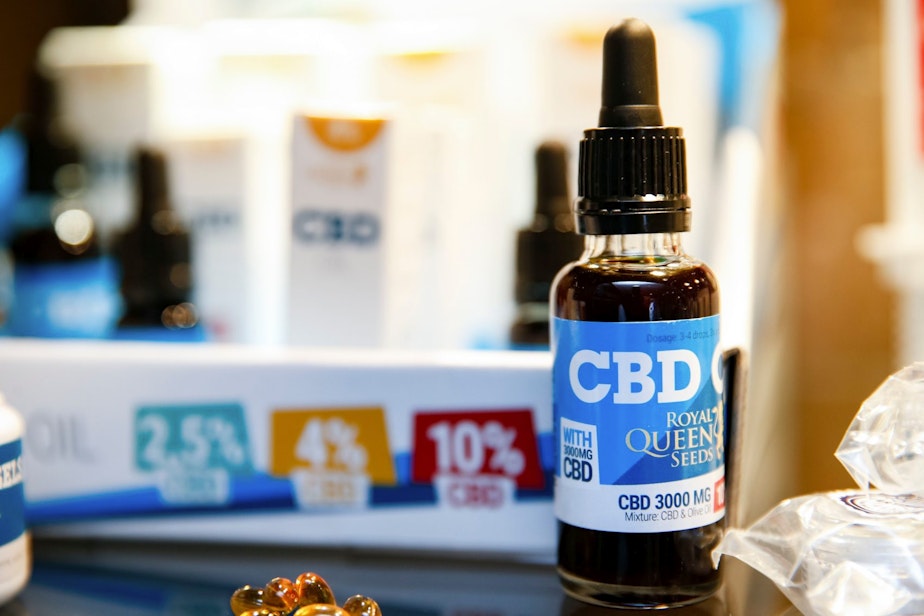CBD Is Budding In Popularity. But What Is The Cannabis Extract, Exactly?

As more states across the U.S. legalize medical or recreational marijuana, another aspect of cannabis is budding in popularity: CBD.
It’s popping up everywhere — in beverages, cosmetics and even pet food. But what exactly is it?
Dr. Jeff Chen, director of the Cannabis Research Initiative at UCLA, explains that CBD, or cannabidiol, is simply a part of the cannabis plant.
“CBD is cannabidiol, not to be confused with cannabinoid. So a cannabinoid is a family of compounds that are unique to the cannabis plant,” he tells Here & Now's Jeremy Hobson. “So THC, which is responsible for the psychoactivity of cannabis, that’s a cannabinoid. CBD is also a cannabinoid.
“They both are part of the cannabinoid family, and they both tend to be the most abundant cannabinoids in the cannabis plant.”
Sponsored
What Is CBD Used For?
“So right now there is only one FDA-approved indication for CBD. It was only FDA approved about six months ago, and it is used to treat epilepsy, but a very specific kind of epilepsy — these rare forms of epilepsy that some children may suffer from,” Chen says. “Many other governments around the world have approved CBD when used in combination with THC in a drug called Sativex for pain and muscle spasms in multiple sclerosis. And that’s pretty much it throughout the rest of the world.“
How Can CBD Be Sold Commercially If Marijuana Is Illegal?
“They aren’t acquiring the CBD from marijuana because that would be federally illegal. They are extracting CBD from hemp,” Chen says. “So hemp, marijuana, cannabis, they’re all referring to the same species of plant. We come up with these arbitrary terms depending on the level of THC in there. So when something has abundant THC, we colloquially think of it as marijuana. When something has less than .3 percent THC, which is a very low amount, that is when our federal government defines it as hemp. And recently there has been new legislation that classifies hemp as an agricultural product. It is no longer a controlled substance. And so what this commercial industry has done is they extract CBD from hemp, and it is an agricultural product, not an illegal narcotic.“
Sponsored
What Would You Feel If You Took CBD?
“First off, you’re not going to feel any psychoactivity, and from some of the surveys I’ve seen, the top three indications that people are reporting using CBD for is pain, insomnia, and anxiety,” Chen says. “And unfortunately for all three of those areas, there’s very little good human studies that have actually explored the use of CBD for those three domains.”
What Are The Risks In Taking CBD?
“CBD actually has a pretty favorable safety profile,” Chen says. “The biggest concern is that it might interact with other drugs that you’re taking. CBD interacts with your liver enzymes in such a way that it might boost the levels of other drugs that you’re taking. For instance, benzodiazepines, antidepressants, things like that. And then another area that we don’t have enough data on is for women who are pregnant, and CBD hasn’t necessarily been widely used for long enough that we can necessarily see an effect at a population, [epidemiological] level. So I would say those are the two areas where we should probably be very cautious.”
How Is CBD Regulated?
“I think there’s a lot of conflicts between state and federal agencies, and even in between federal agencies, and it’s created a quagmire around CBD regulations,” Chen says. “So I’ll give you an example: As of a few weeks ago, the 2018 farm bill passed, and it explicitly removed hemp and any derivatives from hemp, such as CBD, from the Controlled Substances Act. Also the same day that the federal farm bill was signed into law by President Trump, the FDA basically said, ‘OK, hemp-derived CBD, it’s no longer a narcotic, but we see it as a pharmaceutical drug.’ Because a pharmaceutical company has already pushed forward all this research and got this drug FDA approved, and therefore, you can only sell products with CBD in it, if you come through the FDA and you get your stuff FDA approved. And so they are basically saying that all of this dietary supplement, herbal sales of CBD is illegal in the eyes of the FDA.”
Sponsored
Ciku Theuri produced this interview and edited it for broadcast with Todd Mundt. Samantha Raphelson adapted it for the web. [Copyright 2019 NPR]
